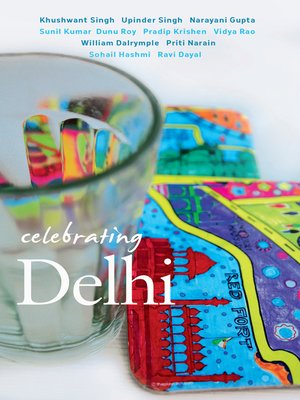
Sign up to save your library
With an OverDrive account, you can save your favorite libraries for at-a-glance information about availability. Find out more about OverDrive accounts.
Find this title in Libby, the library reading app by OverDrive.



Search for a digital library with this title
Title found at these libraries:
| Loading... |
Delhi, located at the crossroads of history, has been occupied, abandoned and rebuilt over the centuries. It has been the capital of the Pandavas, the Rajputs, Central Asian dynasties, the Mughals and the British, and is best described as a melting pot of these vastly varying traditions and customs. A galaxy of experts come together to offer fresh perspectives on the capital city. Originally part of The Sir Sobha Singh Memorial Lecture series organized by The Attic in collaboration with the India International Centre and the Indian National Trust for Art and Cultural Heritage, this updated selection explores Delhi's living syncretic heritage. The essays illuminate unknown and fascinating aspects of the city's history. We learn, for instance, how Sir Sobha Singh transplanted Delhi's two foundation stones by bullock-cart in the stealth of the night from Kingsway Camp to Raisina Hill. In a different departure, archival records point to the fundamental ecological miscalculation in the British choice of trees to line the avenues of Imperial New Delhi. Place names, part of the cultural fabric of a city, unearth a vanishing history of Delhi, while the contrasting history of Sufi shrines draws attention to the spiritual masters, the pirs, and their search for truth. This open-mindedness is reflected in the letters and public proclamations issued from the Mughal court in the Delhi uprising of 1857. These were emphatically religious, yet inclusive of both Hindus and Muslims. In our time a different take on the reality of refugee and resettlement colonies shows the blindness of the city's civic planners, and reveals who was making and who was breaking the city in the twentieth century. As the centre of political power for centuries, many great artists, poets and musicians found patronage at the royal courts of Delhi. The city has been home to a rich tradition of classical music—both the Sufi traditions of Central Asia and the darbari (courtly) style explore the development of the rich Delhi gharana tradition, as well as the birth, growth, banishment and reinvention of the language of Delhi over centuries. The many peoples who made Delhi their home through the centuries have all contributed to the creation and development of a sumptuous cuisine noted for its rich variety. Celebrating Delhi takes you on a journey, both varied and unexpected.






